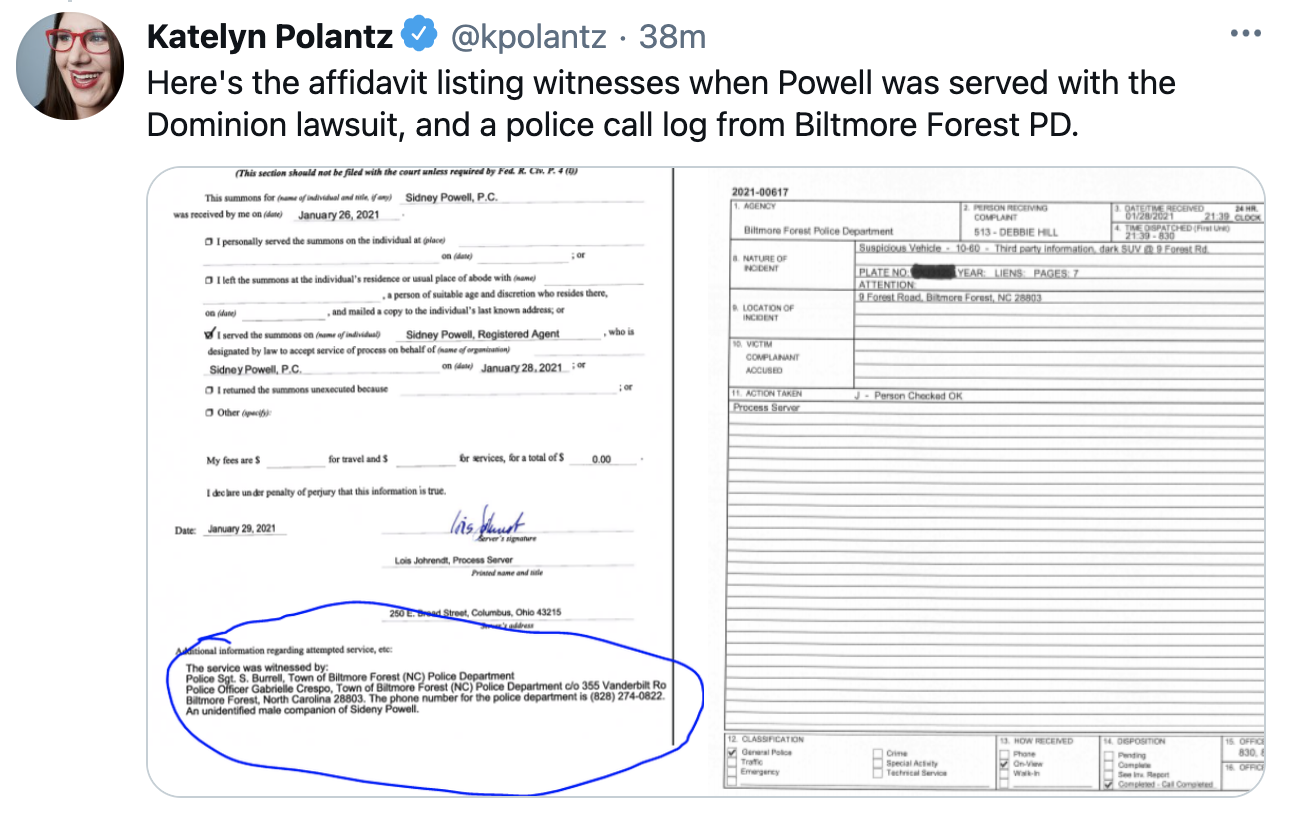A courtroom in the Pioneer Courthouse in Portland, Oregon (photo by David Lat).
Ed. note: This column originally appeared on Original Jurisdiction, the new Substack publication from David Lat. Judicial Notice is a weekly review of notable legal news that appears each Saturday. You can register to receive Judicial Notice and other updates from Original Jurisdiction through this signup page.
As Original Jurisdiction hits the two-month mark, I’m happy to report that I’m just a few readers shy of 2,000 subscribers. Thanks to all of you for subscribing and helping to spread the word.
Now, on to the news.
Lawyer Of The Week: New York State Senator Brad Hoylman
The obvious picks for LOTW honors would be the lawyers involved in the Trump impeachment trial — the nine house managers, all lawyers; their outside advisors, including Barry Berke and Joshua Matz; and Donald Trump’s defense team, including Bruce Castor and David Schoen. But you don’t read Judicial Notice to learn about the obvious.
So I’m going in a different direction and naming New York State Senator Brad Hoylman, a Rhodes Scholar and Harvard Law School graduate, as Lawyer of the Week. Hoylman, Chair of the Senate Judiciary Committee, just secured the repeal of New York’s notorious “walking while trans” law — an overbroad anti-loitering statute that gave rise over the years to police abuse and harassment, especially of women of color, many of them transgender. Hoylman — a Democrat who represents the 27th District, and a member of the LGBTQ community himself — was lead sponsor of the bill, which was sponsored by Amy Paulin in the Assembly.
As you might expect from a lawyer, Hoylman looks out for the legal profession as well. He’s also the lead sponsor of Senate Bill S8682A, which would create a form of diploma privilege in New York State, sparing thousands of law school graduates from having to take the bar exam in the midst of the coronavirus pandemic — an increasingly popular option given the challenges of administering a bar exam during a global public health crisis.
Runner-up: Perkins Coie associate Zachary Newkirk, who will appear on Jeopardy’s tournament of champions later this year after winning almost $125,000 over six episodes in 2020. Good luck, Zachary!
Judge Of The Week: Judge Lynn Hughes
Judge Lynn Hughes (S.D. Tex.) strikes (out) again. As reported by Alison Frankel of Reuters (via Howard Bashman of How Appealing), the frequently reversed Judge Hughes just got benchslapped yet again by the Fifth Circuit, this time in Miller v. University of Houston. These tweets, by Raffi Melkonian and Orin Kerr, say it all:
You can read the full opinion here (also via Howard). It’s a doozy.
Runners-up: Judge Juliet Howard and Judge Norma Jennings, both of New York City Housing Court. When Judge Howard takes the bench later this month, they will become the first married same-sex couple appointed to the same court in New York, according to the Richard C. Failla LGBTQ Commission of NY Courts. Matthew Skinner, executive director of the Commission, commented that the duo “really add something wonderful to the bench in New York City.” Congratulations, Your Honors!
Ruling Of The Week: Tsao v. Captiva MVP Restaurant Partners LLC
The Supreme Court issued some interesting rulings this past week. It gave California churches partial relief from COVID-19 restrictions, ruled in favor of Germany in a closely watched case over Nazi-era art, and held that federal courts can review an administrative board’s refusal to reopen a case denying disability benefits to a railroad worker. That third case, Salinas v. U.S. Railroad, was the first 5-4 ruling in an argued case this Term, and the line-up was interesting; Chief Justice John Roberts and Justice Brett Kavanaugh joined the three liberal justices to rule for the plaintiff.
But big-ticket rulings from SCOTUS are obvious. And, as noted, you don’t come here for the obvious.
So for Ruling of the Week, I’m actually going with the Eleventh Circuit’s decision in Tsao v. Captiva MVP Restaurant Partners LLC, which I’d file under “seemingly boring but actually important.” The case presented two questions. First, did plaintiff Tsao, patron of a fast-casual restaurant chain whose information was stolen in a data breach, have standing to sue because of exposure to the future risk of identity theft, absent any actual misuse of his information? Second, were Tsao’s efforts to mitigate the risk of future identity theft, such as canceling a compromised credit card (and losing out on reward points), a concrete injury sufficient to establish standing?
Judge Gerald Bard Tjoflat, writing on behalf of himself and Judge William B. Traxler (4th Cir.), answered no to both questions. Judge Adalberto Jordan concurred in the judgment, ending his concurrence by all but begging SCOTUS to get involved: “Hopefully the Supreme Court will soon grant certiorari in a case presenting the question of Article III standing in a data breach case.”
I believe that the Court will — and should — take such a case. As practicing litigators know, standing, which might seem dry and boring, is actually of critical importance. And as data breaches become increasingly common, the issue of who can sue over a breach and when will only grow in significance.
Litigation Of The Week: State Attorneys General Versus McKinsey
McKinsey & Company, the Cravath of management consulting, just announced a massive $573 million settlement with the attorneys general of 47 states, the District of Columbia, and five territories. The settlement resolves investigations into McKinsey’s role in helping its clients “turbocharge” their opioid sales, which fueled the opioid epidemic in the United States. The company also struck separate deals with Washington State, for $13 million, and West Virginia, for $10 million. (Nevada has not settled and continues to pursue its own opioid investigation.)
As noted by the New York Times, the settlement is striking because it’s rare to see McKinsey held accountable for its work on behalf of clients — clients who, McKinsey likes to stress, receive McKinsey advice but ultimately make their own decisions. The terms of the settlement are also noteworthy: although McKinsey admits no wrongdoing, which is standard for such deals, it agreed to abide by court-ordered restrictions on its work with certain addictive narcotics, to retain emails for five years, to disclose potential conflicts of interest when bidding for state contracts, and to put tens of thousands of pages of documents about its opioid work onto a publicly available database.
This settlement, while sizable and sweeping, does not represent the end of McKinsey’s legal woes. It doesn’t preclude local governments from suing the consulting giant, nor does it bind the federal government — so stay tuned to see whether the Biden administration takes action.
Speaking of the Biden administration, my first runner-up for Litigation of the Week is the Department of Justice’s lawsuit against Yale University, challenging the school’s affirmative action policy as discriminating against white and Asian-American applicants — a lawsuit the new administration just dropped. Keep an eye out for similar shifts in government positions over the weeks and months ahead.
Second runner-up: election technology maker Smartmatic’s $2.7 billion lawsuit against Fox News and three of its anchors, Maria Bartiromo, Jeanine Pirro, and Lou Dobbs (now a former Fox anchor). The 276-page complaint was filed on Smartmatic’s behalf by J. Erik Connolly of Benesch, Friedlander, Coplan & Aronoff LLP. (In case you’re wondering why Smartmatic filed in New York Supreme Court rather than in a federal court, it’s because Smartmatic and Fox News, both Delaware corporations, lack diversity.)
Deal Of The Week: Stone Point Capital And Insight Partners Buying CoreLogic
On Thursday, a pair of private equity firms, Stone Point Capital LLC and Insight Partners, announced their purchase of real estate-data provider CoreLogic Inc. for $6 billion — a handsome 51 percent premium to CoreLogic’s share price last summer, which is when shareholder activists showed up on the scene and started making noise.
Congratulations to the three law firms advising the principals: Skadden Arps for Corelogic, Kirkland & Ellis for Stone Point, and Willkie Farr for Insight. But note that the deal isn’t quite done yet. Rival bidder CoStar Group Inc., another player in the real estate-data space, is reviewing its options — which could include a new bid or a proxy fight. So more work for law firms might still be on the way.
Runner-up: Bayer AG’s $2 billion settlement of future claims that its widely used weedkiller, Roundup, causes cancer. Settlements of litigations are, of course, deals — and sometimes the dollar amounts involved can dwarf those of M&A or capital markets transactions.
Law Firm Of The Week: Kaplan Hecker & Fink
This week, whenever there was some interesting legal matter in the news, lawyers from Kaplan Hecker & Fink — the elite New York boutique led by Robbie Kaplan, Sean Hecker, and Julie Fink — were there.
On Tuesday, the House impeachment managers delivered their 77-page brief laying out their case against former President Donald Trump. Although former KHF partner Joshua Matz is mentioned only in the final footnote thanking him for his “invaluable assistance,” Matz — who, along with Professor Laurence Tribe, literally wrote the book on impeachment — surely played a major role in this effort. (Matz is working on the impeachment trial in his personal capacity — just as he did when he worked on Trump’s first impeachment trial, he resigned from Kaplan Hecker & Fink before going to help out the House managers — but don’t be surprised if he returns to the firm yet again when this is all over.)
Also on Tuesday, Pornhub issued a statement announcing what it described as “a series of industry-leading safety and security policies,” which it enacted in the wake of a scathing New York Times expose alleging that the online porn purveyor essentially turned a blind eye to the proliferation of illegal content on its platform. The new policies and procedures reflect the results of KHF’s independent review of Pornhub’s moderation procedures and other safety protocols. Some might find representing a porn platform to be distasteful — but like it or not, porn isn’t going away anytime soon, so it’s important to make sure that what’s out there is legal and consensually produced.
On Wednesday, Judge Norman Moon (W.D. Va.) set an October 25 trial date for Sines v. Kessler, the landmark litigation brought by KHF against the neo-Nazis and white supremacists responsible for the August 2017 Charlottesville car attack that killed Heather Heyer and injured 19 others. The lawsuit, first filed back in 2017 by Robbie Kaplan and Karen Dunn (then of Boies Schiller Flexner), raises the interesting and important issue of where to draw the line between protected free speech and illegal incitement to violence.
When I interviewed Robbie Kaplan back in 2017 about the launch of her new firm, she spoke about her desire “to fuse together a private commercial practice with a public interest practice for the mutual benefit of both.” Almost four years into the venture, it looks like she and her team are doing just that.
Lateral Move Of The Week: Biglaw Spawning Boutiques
We’re still in the first quarter, so not surprisingly, lateral movement remains brisk. The intellectual property space was especially active. Jenner & Block hired three partners — Mark Davis and Ron Pabis from Goodwin Procter, and Alex Hadjis from Oblon, McClelland, Maier & Neustadt — to launch an International Trade Commission (ITC) practice group. And two former administrative patent judges of the Patent Trial and Appeal Board (PTAB) found new gigs: Phil Hoffmann joined Ropes & Gray as a senior attorney, and Scott Kamholz left Covington & Burling, where he had been of counsel, to join Flagship Pioneering’s Tessera Therapeutics as vice president of intellectual property.
There were also a number of notable office openings, fueled by partner poaching. K&L Gates launched in Nashville, after hiring 27 attorneys from area firms Waller Lansden Dortch & Davis, Butler Snow, Dickinson Wright, and Bass, Berry & Sims; Quinn Emanuel launched in Atlanta, after hiring antitrust partner Debra Bernstein from Alston & Bird; and Holland & Knight launched in Orange County, California, after hiring seven litigators previously with the Enterprise Counsel Group.
But I think the biggest moves of the week were three groups breaking away from Biglaw to launch boutiques. This continues what I see as a decade-long trend of partners leaving large firms in search of more autonomy, more collegiality, fewer conflicts, less overhead, and — at least in some cases — more money. Specifically:
- Eight partners, including international arbitration practice founder and head Emmanuel Gaillard, left Shearman & Sterling to form Gaillard Banifatemi Shelbaya Disputes. The new firm, which will have offices in Paris, London, and New York, will reportedly take with it some $30 million to $40 million in revenue, as well as 30 or so associates. (They seem to be leaving on good terms; Shearman even issued a press release about the departures.)
- Seven partners — Andrew Glenn, Lyn Agre, Jed Bergman, Trevor Welch, Olga Fuentes, Michael Bowen, and Marissa Miller — left Kasowitz Benson to form Glenn Agre Bergman & Fuentes. The new firm is subletting space from Boies Schiller Flexner in New York and San Francisco, and Glenn Agre and Boies Schiller plan to work on cases together as well. (Name partner Olga Fuentes is married to Boies Schiller partner Peter Skinner.)
- Former Texas Solicitor General Scott Keller left Baker Botts, where he served as head of the firm’s Supreme Court practice, to form Lehotsky Keller with Steven Lehotsky, who left his role as chief litigation counsel at the U.S. Chamber of Commerce. Both former Supreme Court clerks (Keller for Justice Anthony M. Kennedy and Lehotsky for Justice Antonin Scalia), they will focus on complex litigation, including practice before the Supreme Court and challenges to federal and state laws and regulations.
Congratulations to these three exciting new firms. Several developments over the past decade or so, including improvements in ediscovery technology and the rise of vendors and alternative legal service providers who focus on large-scale discovery, have made high-end litigation much easier to handle without all the bodies of Biglaw. You just need the brainpower — which is why I’m betting on boutiques as the future of high-end, cutting-edge litigation.
 David Lat, the founding editor of Above the Law, is a writer, speaker, and legal recruiter at Lateral Link, where he is a managing director in the New York office. You can read his latest writing about law and the legal profession by subscribing to Original Jurisdiction, his Substack newsletter. David’s book, Supreme Ambitions: A Novel (2014), was described by the New York Times as “the most buzzed-about novel of the year” among legal elites. Before entering the media and recruiting worlds, David worked as a federal prosecutor, a litigation associate at Wachtell Lipton, and a law clerk to Judge Diarmuid F. O’Scannlain of the U.S. Court of Appeals for the Ninth Circuit. You can connect with David on Twitter (@DavidLat), LinkedIn, and Facebook, and you can reach him by email at dlat@laterallink.com.
David Lat, the founding editor of Above the Law, is a writer, speaker, and legal recruiter at Lateral Link, where he is a managing director in the New York office. You can read his latest writing about law and the legal profession by subscribing to Original Jurisdiction, his Substack newsletter. David’s book, Supreme Ambitions: A Novel (2014), was described by the New York Times as “the most buzzed-about novel of the year” among legal elites. Before entering the media and recruiting worlds, David worked as a federal prosecutor, a litigation associate at Wachtell Lipton, and a law clerk to Judge Diarmuid F. O’Scannlain of the U.S. Court of Appeals for the Ninth Circuit. You can connect with David on Twitter (@DavidLat), LinkedIn, and Facebook, and you can reach him by email at dlat@laterallink.com.
 Staci Zaretsky is a senior editor at Above the Law, where she’s worked since 2011. She’d love to hear from you, so please feel free to email her with any tips, questions, comments, or critiques. You can follow her on Twitter or connect with her on LinkedIn.
Staci Zaretsky is a senior editor at Above the Law, where she’s worked since 2011. She’d love to hear from you, so please feel free to email her with any tips, questions, comments, or critiques. You can follow her on Twitter or connect with her on LinkedIn.

















 Kathryn Rubino is a Senior Editor at Above the Law, and host of
Kathryn Rubino is a Senior Editor at Above the Law, and host of 
